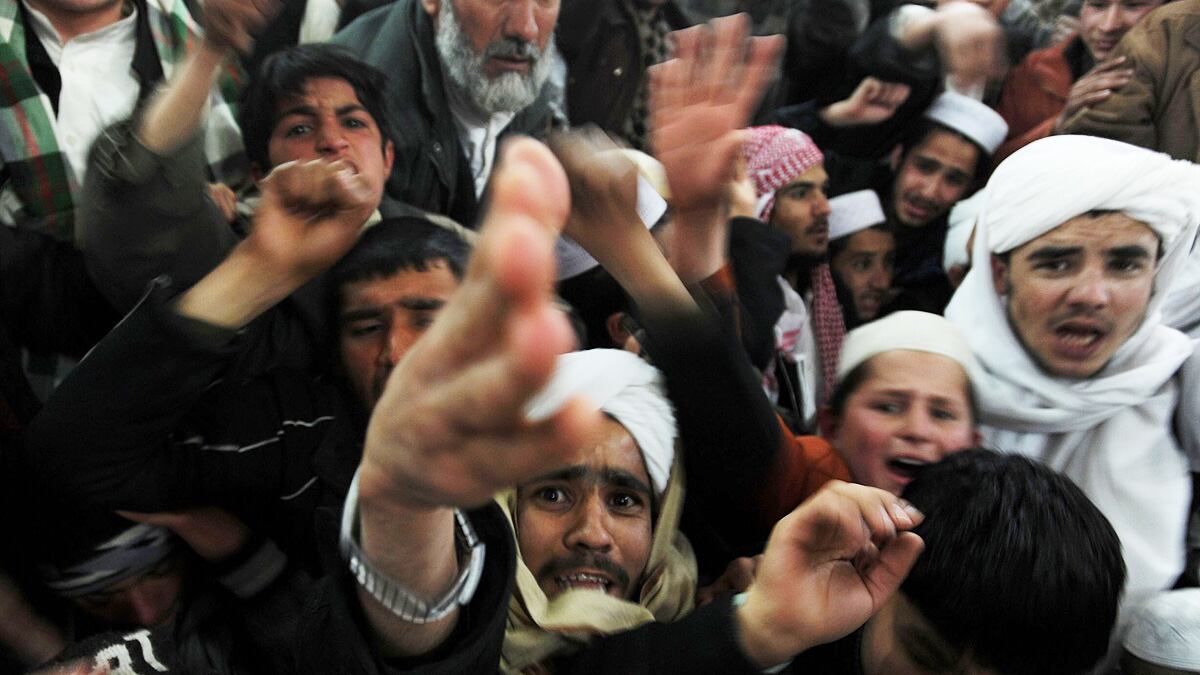The United States plans to end the war in Afghanistan by December 2014. But the violence, retaliation, and mistrust that followed this week’s Quran-burning incident have put the future of the U.S.-Afghanistan relationship at risk. If decisive action is not taken by both sides to reduce tension, shore up respective public opinion, and restore cooperation and confidence in a desired long-term relationship, Afghanistan could be “lost” well before then.
The full impact of the incident may not be known for some time, but there is serious fallout already from this inexplicable military misstep, when copies of the Quran were mistakenly put in an incinerator at a U.S military base: days of violent Afghan protests, two separate incidents in which four U.S. soldiers have been killed by members of the Afghan military, the suspension of direct military engagement with Afghan security ministries, and angry voices in both countries that will put political pressure on the two leaders who must manage this challenge.
The issue quickly migrated onto the presidential campaign trail. Newt Gingrich called the apology by President Obama (Secretary of Defense Leon Panetta and Gen. John Allen, the commander of U.S. and international forces in Afghanistan, did as well) an “outrage.” Rick Santorum said it “shows weakness.”
Both candidates still see Afghanistan in conventional military terms, while the struggle long ago became, in the words of one of Allen’s predecessor’s, Gen. Stanley McChrystal, a “war of perception.”
Despite these dubious shots from the Republican candidates, the president understood the danger and responded appropriately in an effort to mitigate the political fallout.
But the question looms, how could any soldier 10 years into the current conflict not understand the potential impact of mistreating the Quran? Less than a year ago, there was also unrest in Afghanistan when Pastor Terry Jones “tried” a Quran and then set it on fire in Florida.

Allen said the latest act of destruction, on a U.S. military base, was “not intentional.” No, it was ignorant, which is worse.
The Quran burning has been a bonanza for the Taliban, which predictably encouraged the retribution we have seen. It has, at least for the moment, retarded the prospects for political talks that the United States hopes will lead to direct negotiations and a conflict-ending agreement between Afghanistan and the Taliban.
The only apparent silver lining is the fact that the violent reaction has been confined largely to Afghanistan. Al Qaeda and its affiliates will undoubtedly try to exploit the episode to restore relevance lost by the Arab Awakening and the deaths of Osama bin Laden and Anwar al-Awlaki. Most of the Islamic world, says one government analyst, remains gripped by events in Syria.
Still, the burning at a minimum casts doubt on the military’s embrace of a new doctrine that emphasizes the civilian population as the “center of gravity” in modern conflict. The generals get it, but too often the lower ranks continue to pursue narrow military objectives without regard to the bigger picture and how operations impact public opinion that is vital to sustaining a long-term strategy.
At this stage, neither Afghan nor American political support can be taken for granted. The calls by Afghan parliamentarians for violence were deeply troubling, demonstrating how fragile the relationship is. The Quran burning placed the Karzai government, with limited political capital to begin with, in a difficult position, but it seems to be doing what it can to limit the damage.
The two shooting incidents involving Afghan and U.S. personnel strike at the heart of the existing strategy and will undoubtedly add to the frustration and tension that already handicaps the U.S.-Afghan relationship.
The future hangs in the balance.
For an object lesson, look at Iraq. The United States, which had wanted to maintain some presence for a longer period, withdrew military forces completely at the end of 2011. The Iraqi government, while sympathetic, could not manage the politics of a long-term presence on terms the United States could accept. Years of friction, indignities, and the perception of impunity took their toll.
Here in the U.S., a war-weary public has welcomed the withdrawal of American forces from Iraq. With the troops gone, Congress has pressured the State Department to scale back its diplomatic presence. Eight years and a trillion dollars later, the nature of a future U.S.-Iraqi partnership is yet to be defined, but will undoubtedly fall short of what was hoped.
A similar outcome in Afghanistan would be costly.
A long-term presence there is needed to retain the existing pressure on extremist groups across the border that pose a threat to Afghanistan, Pakistan, and the United States. A residual force will send a clear signal to the Taliban that the United States is not leaving Afghanistan; they cannot simply wait for our forces to depart.
But major mistakes are being made on the battlefield—the Quran burning, the video depicting Marines urinating on dead Taliban fighters, and the accidental killing of 24 Pakistani soldiers late last year that threatens vital Pakistani support for Afghanistan—mistakes that threaten to undermine an ultimate political outcome favorable to the United States.
This strongly suggests that the current military strategy has run its course. We need a different military approach and a different force whose presence is sustainable and geared for the long-term.
The Obama administration actually has the right approach, but it needs to speed up the clock.
As Secretary Panetta suggested recently, the long-planned transition to Afghan-government leadership needs to start sooner and be completed sooner. Waiting for the perfect moment means waiting forever.
The United States should also shift its mission from counterinsurgency to counterterrorism earlier. The presumption in 2009 was that the existing counterinsurgency strategy would enhance the prospects of a political negotiation. At this point, it’s increasingly looking like an impediment.
Replacing combat forces with better-trained and -disciplined special-operations forces should reduce friction and enhance the prospects for a long-term partnership.
Otherwise, time could run out in Afghanistan like it did in Iraq.






